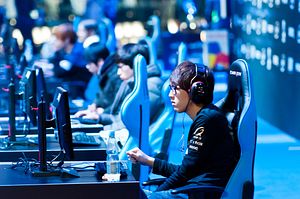South Korea’s parliament is considering an anti-gaming bill that will classify online gaming as a potentially antisocial addiction alongside gambling, drugs and alcohol.
The bill is backed by 14 ruling party lawmakers, parents, religious groups and doctors who believe that online gaming is having a negative effect on schooling, family life and work.
“Without online games, kids would talk to their mother and play,” said Kim Min-sun, a mother of two who supports the bill.
Proponents of the bill argue that online games can contribute to social problems. For example, a couple spent most of their time raising a virtual child online at an Internet cafe while they allowed their 3-month-old son to starve in 2012. In the same year a 22-year-old murdered his mother for “nagging” him about playing Internet games.
If passed, the law will put a limit on gaming advertising and build a fund to fight gaming addiction by ordering the gaming industry to hand over one percent of their revenue.
In the past the South Korean government has taken other measures to combat online addiction. In 2011, they passed the “Shutdown Law,” which bans gamers under the age of 16 from playing between midnight and 6 A.M. The following year, they introduced a “Cooling Off” system which introduced mandatory breaks and further limited the number of hours of gaming students could play.
Some worry that these provisions will harm what is a significant export industry in South Korea. In 2012, MapleStory and other online games earned more money than Gangnam Style, K-pop music, and other cultural exports combined, according to The Independent. Professional gamers also exist in South Korea, where they have corporate sponsorship, live broadcasts of their competitions, and the wealth, status and rock star treatment usually associated with professional athletes. Players such as Jung Myung-hoon and Yo Hwan-lim earn up to $400,000 a year.
The gaming industry also opposes the idea that online gaming should be placed on the same level as harmful drugs and that other issues should be addressed, such as the high academic pressure being placed on children, which may lead to them turning to gaming as a way to cope.
“Workers in the Internet game industry are worrying about the bill. Our society does not understand Internet games. I feel sad when I hear that games are anti-social as well as harm health,” said Se-jeong Kim, the CEO of game company Blueside.

































